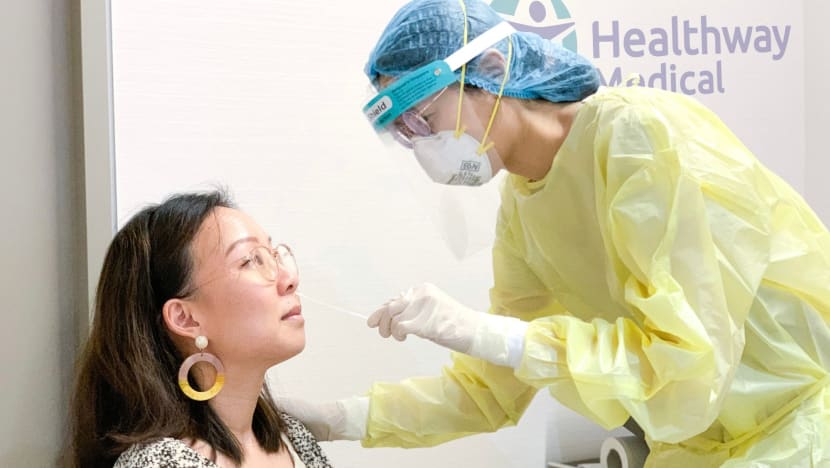MOH introduces new measures to reduce strain on healthcare system amid spike in COVID-19 cases

A patient gets a nasal swab for COVID-19 testing at a Healthway Medical clinic. (Photo: Healthway Medical Group)
SINGAPORE: As Singapore reported a new daily high of more than 26,000 COVID-19 cases, the Ministry of Health (MOH) on Tuesday (Feb 22) introduced new measures to help ease the strain on the healthcare system.
Opening hours for Public Health Preparedness Clinics (PHPCs) will be extended, while telemedicine consultations will be made available at combined test centres for people with COVID-19 symptoms.
These measures are meant to provide alternatives for medical attention during the midst of a wave of Omicron infections, the ministry said in a press release.
In its daily update released later on the MOH website, the ministry reported 26,032 new COVID-19 infections.
MOH noted that local hospitals, polyclinics and general practitioner clinics are "very busy", and that healthcare workers are under severe pressure.
"It may take a few weeks before the transmission wave peaks and subsides.
"Many patients coming forward to hospitals, polyclinics and GP clinics have no or mild symptoms," said MOH, adding that they seek a medical certificate or an antigen rapid test (ART) that is conducted by a medical professional and documented in MOH’s records.
"This has added significant workload to our healthcare providers who are already under significant pressure and stress. Our healthcare service providers will need help and cooperation from employers and members of the public."
The Health Ministry urged employers not to insist on medical certificates or recovery memos as proof of employees' COVID-19 infection. Instead, employees who are at low risk and have mild symptoms or are physically well should isolate and recover at home instead of visiting clinics or hospitals.
"They can submit a photograph of their test results or a video of them taking the ART," said MOH.
Selected PHPCs will operate extended hours, in an effort to "help spread out peak patient load at private clinics".
From Feb 25 to Mar 10, those PHPCs will open up to 11pm on weekdays, between 2pm and 5pm on weekend afternoons and up to 11pm on weekend nights. Selected polyclinics will also be operating on Saturday afternoons and Sunday mornings.
For a list of clinics providing extended hours, visit https://flu.gowhere.gov.sg.
From Feb 26, combined test centres will provide telemedicine consultations for symptomatic members of the public who come for testing during the weekends.
Telemedicine doctors will provide face-to-face video consultations and prescribe and deliver medications. Testing and consultations will be funded by the Government during this period, said MOH.
The booking of Acute Respiratory Infection (ARI) testing and telemedicine consultation appointments at the combined test centres can be made at go.gov.sg/ari-weekend-testing.
Patients can also opt to consult a doctor virtually through an MOH-approved telemedicine provider. A list of such services can be found at https://flu.gowhere.gov.sg.
MOH advised the public that unless they are experiencing an emergency, not to rush to a hospital emergency department.
"Patients who walk into emergency departments with non-emergency conditions, including children, may be diverted to other urgent care clinics or primary care clinics for further assessment, so as to prioritise emergency department resources for patients who need the medical care."
SURGE IN DEMAND FOR HOSPITAL BEDS
MOH encouraged anyone requiring medical attention to consult a primary care doctor first.
While the number of patients needing oxygen supplementation and intensive care unit care is "not high", there has been a surge in demand for hospital beds, mostly from patients recovering from underlying chronic illnesses.
The Health Ministry said it was doing "whatever we can" to support healthcare providers, including ramping up capacity in hospitals, right-siting patients at COVID-19 treatment facilities as much as possible, spreading patient load to private hospitals, allowing residents in nursing homes to recover in-situ and supplementing its healthcare manpower with the volunteer SG Healthcare Corps and medics from the Singapore Armed Forces.
Health protocols have also been further adjusted to allow more patients to recover at home, MOH added.
Though the COVID-19 infections of those undergoing self-recovery at home under Protocol 2 are not documented in MOH’s official records, the significance of having an official record will be downplayed, MOH noted.
Rostered routine testing will be stepped down for most industries, as will PCR tests for travellers.
MOH added that while those who have COVID-19 while being fully vaccinated are exempted from a booster shot, they are still encouraged to take a booster shot.
Singapore’s expert committee on COVID-19 vaccination recommends that such individuals may receive a booster shot 28 days after infection, although they are recommended to do so three months from the infection for better effectiveness.
Vaccination centres have been administering booster shots to those eligible, ensuring that most infected and recovered individuals can take their booster shots within the 270 days after their primary series, and before their fully vaccinated status lapses.
"We seek everyone’s continued effort and cooperation to do our part to preserve our medical resources for those who need them most," MOH said.
BOOKMARK THIS: Our comprehensive coverage of the COVID-19 pandemic and its developments
Download our app or subscribe to our Telegram channel for the latest updates on the coronavirus pandemic: https://cna.asia/telegram















